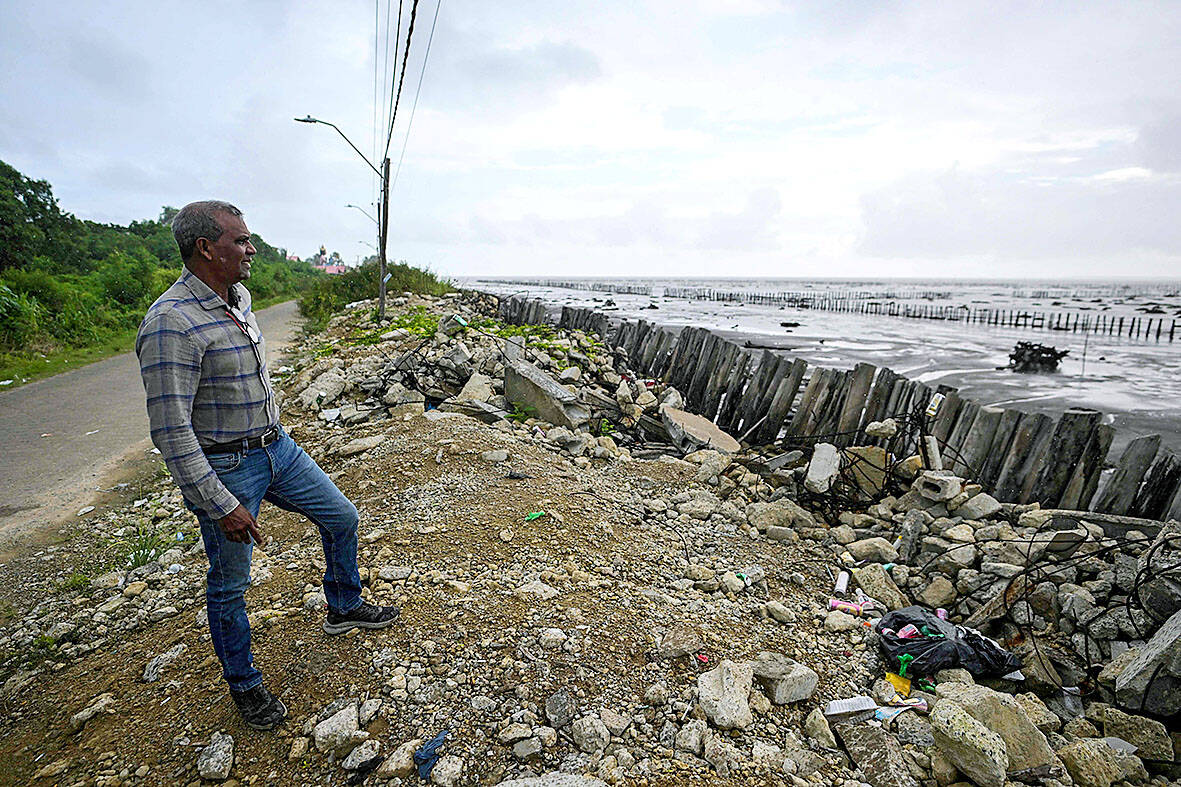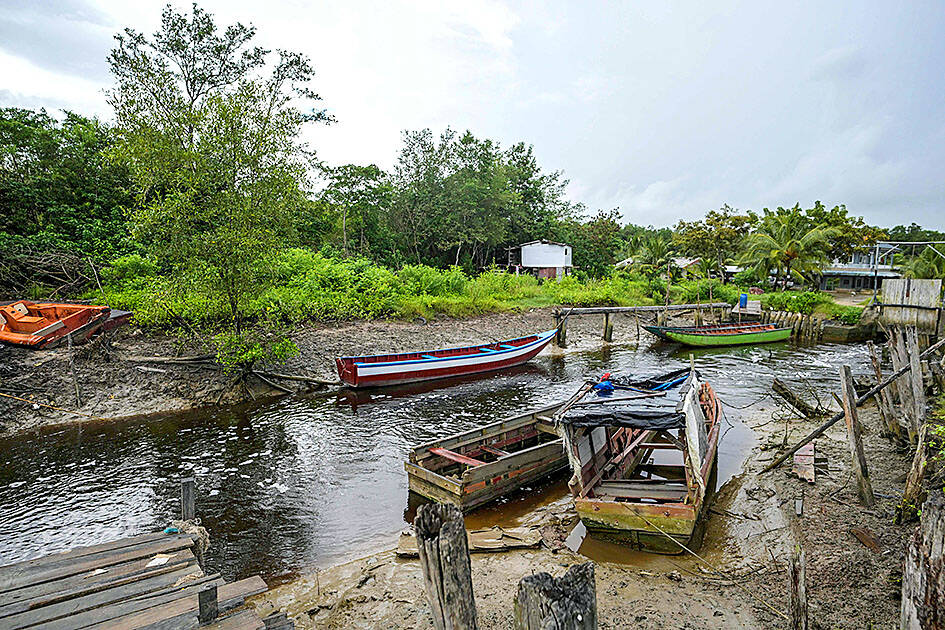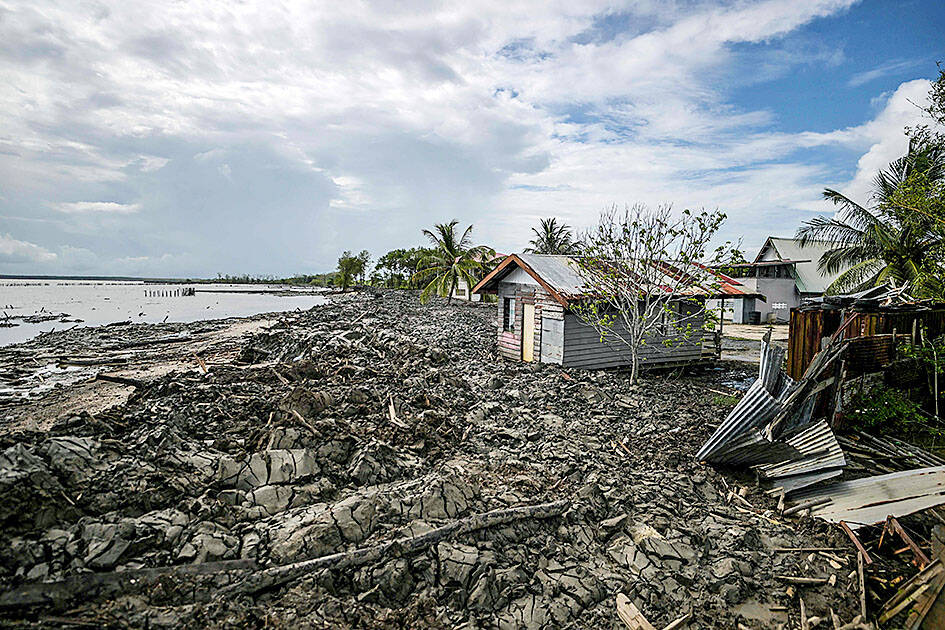In the dead of night on a beach in Suriname’s capital Paramaribo, a group of just-hatched baby sea turtles clamber out of their sandy nesting hole and race, flippers flailing, towards the sea.
For years, endangered leatherbacks and green turtles have emerged onto Braamspunt beach to lay their eggs.
But the land spit at the tip of the Suriname river estuary is rapidly vanishing as erosion, caused by rising sea levels linked to climate change, gobbles up entire swathes of Paramaribo’s coastline.

Photo: AFP
“Maybe we’ll get one more season out of this,” Kiran Soekhoe Balrampersad, a guide who accompanied a group of tourists on a recent expedition to see the nesting turtles, said.
“But after that there’ll no longer be a beach,” he added dolefully.
Suriname, South America’s smallest country, is one of the most vulnerable in the world to rising sea levels.

Photo: AFP
Nearly seven out of 10 people in the former Dutch colony of 600,000 inhabitants live in low-lying coastal areas, according to the UN Intergovernmental Panel on Climate Change.
“Every day I see a piece of my land disappear,” said Gandat Sheinderpesad, a 56-year-old farmer who has lost 95 percent of his smallholding to the sea.
Local authorities have for years been trying to find a way to hold back the tide.

Photo: AFP
“Some areas are not problematic because we have five, 10, even 20 kilometers of mangrove” acting as a buffer between the waves and the shore, Minister of Public Works Riad Nurmohamed said.
But near Paramaribo, “there is just one kilometer so it’s a very vulnerable zone,” he added.
In 2020, a program to restore the capital’s mangroves was launched.
UN Secretary General Antonio Guterres sought to add VIP power to the initiative in 2022 by wading into the mud to personally plant seedlings.
But five years later, Sienwnath Naqal, the climate change and water management expert who led the project, surveys a scene of desolation.
The sea is now lapping at the edge of a road and the wooden stakes to which he had attached hundreds of samplings are largely bare.
High seas carried away the substrate sediment, leaving the roots exposed.
“Over the last two to three years the water forcefully penetrated the mangroves, which were destroyed,” Nurmohamed said.
The dredging of sand at the entrance to Paramaribo estuary to facilitate the passage of boats headed upriver to the port also contributed to the erosion, Naqal said. But like the Amazon rainforest in neighboring Brazil, the destruction was also deliberate in places, with farmers uprooting mangroves to make way for crops.
With the water lapping at the feet of Paramaribo’s 240,000 people, Suriname has changed tack and set about building a dyke.
For Sheinderpesad, the levee represents his last chance of remaining on his land.
“I have nowhere else to go. When we have the dyke, I will be safer, although I’m not sure for how long,” he said.
The 4.5km-long barrier will cost US$11 million, which the government has vowed to fund from state coffers.
“If you go see donors it takes years before you can start to built. We have no time to waste, we’ll be flooded,” Nurmohamed explained.
But plugging one hole in the country’s maritime defenses will not suffice to keep the mighty Atlantic at bay.
The government wants to build up the entire network of dykes that dot the country’s 380km coastline. It’s just not sure where to find the money.
“It’s a colossal investment,” Nurmohamed said.
The country’s newly discovered offshore oil deposits may provide the answer.
Last year, French group TotalEnergies announced a US$10.5 billion project to exploit an oil field off Suriname’s coast with an estimated capacity of producing 220,000 barrels per day.

Growing up in a rural, religious community in western Canada, Kyle McCarthy loved hockey, but once he came out at 19, he quit, convinced being openly gay and an active player was untenable. So the 32-year-old says he is “very surprised” by the runaway success of Heated Rivalry, a Canadian-made series about the romance between two closeted gay players in a sport that has historically made gay men feel unwelcome. Ben Baby, the 43-year-old commissioner of the Toronto Gay Hockey Association (TGHA), calls the success of the show — which has catapulted its young lead actors to stardom -- “shocking,” and says

Inside an ordinary-looking townhouse on a narrow road in central Kaohsiung, Tsai A-li (蔡阿李) raised her three children alone for 15 years. As far as the children knew, their father was away working in the US. They were kept in the dark for as long as possible by their mother, for the truth was perhaps too sad and unjust for their young minds to bear. The family home of White Terror victim Ko Chi-hua (柯旗化) is now open to the public. Admission is free and it is just a short walk from the Kaohsiung train station. Walk two blocks south along Jhongshan

The 2018 nine-in-one local elections were a wild ride that no one saw coming. Entering that year, the Chinese Nationalist Party (KMT) was demoralized and in disarray — and fearing an existential crisis. By the end of the year, the party was riding high and swept most of the country in a landslide, including toppling the Democratic Progressive Party (DPP) in their Kaohsiung stronghold. Could something like that happen again on the DPP side in this year’s nine-in-one elections? The short answer is not exactly; the conditions were very specific. However, it does illustrate how swiftly every assumption early in an

Snoop Dogg arrived at Intuit Dome hours before tipoff, long before most fans filled the arena and even before some players. Dressed in a gray suit and black turtleneck, a diamond-encrusted Peacock pendant resting on his chest and purple Chuck Taylor sneakers with gold laces nodding to his lifelong Los Angeles Lakers allegiance, Snoop didn’t rush. He didn’t posture. He waited for his moment to shine as an NBA analyst alongside Reggie Miller and Terry Gannon for Peacock’s recent Golden State Warriors at Los Angeles Clippers broadcast during the second half. With an AP reporter trailing him through the arena for an